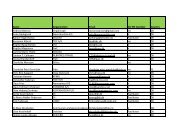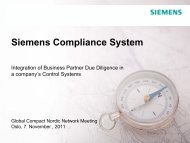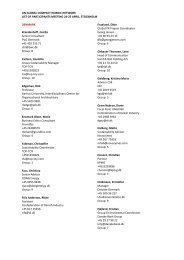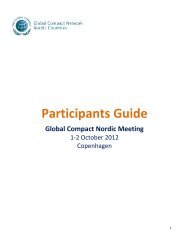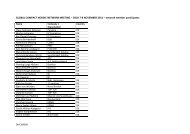Business Against Corruption - A Framework for Action - International ...
Business Against Corruption - A Framework for Action - International ...
Business Against Corruption - A Framework for Action - International ...
- No tags were found...
Create successful ePaper yourself
Turn your PDF publications into a flip-book with our unique Google optimized e-Paper software.
5The case <strong>for</strong> fighting corruption<strong>Business</strong>es face high (and related) ethical andbusiness risks and potential costs when theyfail to effectively combat corruption in all its<strong>for</strong>ms. As part of the problem, they can alsobe part of the solution. This section addresseswhy all companies should have zero toleranceof corruption.The ethical case<strong>Corruption</strong> is inherently wrong. It is a misuseof power and position and has a disproportionateimpact on the poor and disadvantaged.It undermines the integrity of all involvedand damages the fabric of the organizationsto which they belong, potentially decreasingmorale (and there<strong>for</strong>e productivity).The reality that laws criminalizing corruptpractices may not always be en<strong>for</strong>ced—thoughen<strong>for</strong>cement is increasing—is no justification<strong>for</strong> accepting (or perpetuating) corrupt practices.To fight corruption in all its <strong>for</strong>ms is simplythe right thing to do, whether or not peopleoutside an organization ever see the results.The business caseCompanies need not justify their ef<strong>for</strong>ts tofight corruption on an ethical basis alone.It is also in a company’s business interestto ensure that it does not engage in corruptpractices. All companies, large and small, arevulnerable to corruption, and the potential<strong>for</strong> internal damage is considerable. The followingare some key reasons <strong>for</strong> avoiding involvementin corrupt practices and <strong>for</strong> takingan active role in combating it and its effects.■■Legal risksRegardless of what <strong>for</strong>m a corrupt transactionmay take, there are obvious legalrisks involved. Not only are most <strong>for</strong>ms ofcorruption illegal where they occur, butit is also increasingly becoming illegal ina company’s home country to engage incorrupt practices in another country. Theprinciple that it is illegal to bribe <strong>for</strong>eignofficials was first established in the USForeign Corrupt Practices Act of 1977.Since then, this principle has gained legalstanding within the whole of the OECDand in a number of other countries. It wasuniversally recognized in 2003, throughthe adoption of the UNCAC.The en<strong>for</strong>cement of anti-corruptionlegislation internationally has so far beenrelatively weak, but this is slowly changing.According to Shearman and Sterling, aninternational law firm based in New York,2009 and 2010 were record years in termsof the number of prosecutions broughtagainst corporations by the United States.In 2010 alone, over US $1.75 trillion inpenalties was assessed (another record),about 80 per cent of which was assessedagainst non-US-based corporations. The USgovernment has continued to hold individualsaccountable, with 13 people sentencedto prison time or probation. The UnitedKingdom’s Bribery Act 2010, which willcome into <strong>for</strong>ce on July 1, 2011, will alsohave substantial international effect.In developing countries and emergingmarkets, where the opportunity <strong>for</strong>corruption has been rife because of weaklaws, regulations and en<strong>for</strong>cement mechanisms,corruption has become an issue ofsignificant political importance, and thereis a growing determination to act and totake those accused of corrupt practicesto court. As noted on the previous pages,there has been a flurry of legislationaround the world intended to create, orto extend the reach and en<strong>for</strong>cement of,anti-corruption laws.There are also a growing number of examplesin which developing countries withlimited capacity to handle such cases haveobtained outside legal assistance. To thisend, the OECD is playing a critical role inensuring that its member states are developinga judiciary capable of en<strong>for</strong>cing theprohibition against the bribery of <strong>for</strong>eignofficials, and, more broadly, the UN Officeon Drugs and Crime (UNODC) is proactivelypromoting the adoption and implementationof the UNCAC through various meansof technical assistance to governments.The UNODC is also developing a web-basedcollaborative <strong>for</strong>um that will serve as arepository of anti-corruption-related knowledgeand has, with the World Bank Group,implemented the Stolen Asset Recovery(StAR) Initiative, which lowers the barriersto the recovery of assets stolen throughacts of corruption. The UNODC is active instrengthening the integrity of the judiciarywhere it has been ethically compromised,developing outreach activities, workingwith the private sector, and following up




